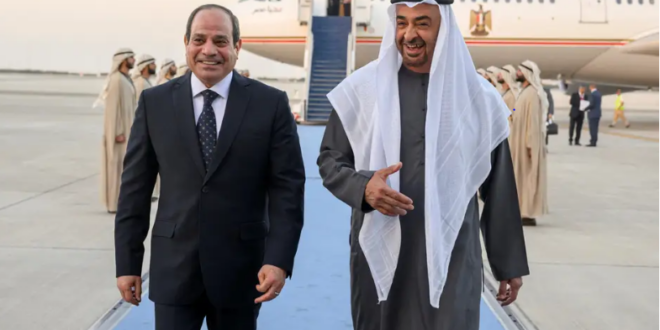Muhamad Yehia
Egyptian authorities have received the second tranche of a $35 billion investment from the UAE, local media reported on Tuesday.
The payment secures the right of Abu Dhabi sovereign wealth fund ADQ to develop the land of Ras El Hekma on Egypt’s north coast.
The $20 billion tranche consists of $14 billion fresh money and $6 billion of Emirati deposits currently held at the Central Bank of Egypt (CBE).
The first tranche of $15 billion was transferred shortly after the Ras El Hekma
Following disbursement of the first tranche, the CBE devalued the pound in response to a growing parallel currency market that was attracting foreign liquidity away from the formal banking sector.
The devaluation helped to secure the finalisation of an International Monetary Fund package worth $8 billion and subsequent agreements with the World Bank and European Union.
According to local reports, the CBE is likely to inject $6 billion of the new funds into the banking sector to help clear arrears and make foreign currency available for essential and non-essential imports.
Abu Dhabi’s $35bn throws Egypt a liquidity lifeline
Egypt must deal with its fundamental challenges
Abu Dhabi’s futuristic vision of an Egyptian metropolis
In its purchasing managers index for April, in which Egypt recorded negative growth, S&P Global said Egyptian importers reported greater availability of foreign currency since the devaluation of the pound.
But it added that foreign exchange supply-demand imbalances persisted throughout the month and hindered economic activity.
On Monday President Abdel Fattah El Sisi inaugurated the first phase of the Future of Egypt project, which ultimately seeks to reclaim 2.2 million feddans (924,000 hectares) of agricultural land.
The project will be irrigated by the Future of Egypt Canal, a 174km-long artificial river in the Western Desert fed by natural aquifers and treated wastewater.
Speaking at the project’s inauguration, President Sisi said the area targeted for cultivation was equal to “three large governorates”, arguing the need for the public sector to take the lead on such a project.
It is part of a larger government effort to increase agricultural land across Egypt by 45 percent by 2027 in a bid to achieve food self-sufficiency. Egypt is regularly the world’s largest buyer of wheat, importing 11 million tonnes in 2023.
In March planning minister Hala Al Saeed reaffirmed ambitions to increase the percentage of locally grown wheat from 45 percent in 2021 to 53 percent in 2024 and 56 percent by 2026.
President Sisi voiced his support for prioritising cash crops that could sell for “three times” the price of wheat.
“We want to benefit from every drop of water,” he said.
 موقع وجه أفريقيا موقع وجه أفريقيا هو موقع مهتم بمتابعة التطورات في القارة الأفريقية
موقع وجه أفريقيا موقع وجه أفريقيا هو موقع مهتم بمتابعة التطورات في القارة الأفريقية


